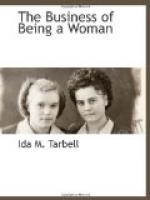If we jump fifty years in the nation’s history to the beginning of the agitation against slavery, we find women among the first and most daring of the protestants against the institution. It was for the sake of shattering slavery that they broke the silence in public which by order of the Christian Church they had so long kept—an order made, not for the sake of belittling women, but for the sake of establishing order in churches and better insuring the new Christian code of morality. The courage and the radicalism of women of the 30’s, 40’s, and 50’s in this country compare favorably with that of the men and women in any revolutionary period in any country that we may select.
The American woman has played an honorable part in the making of our country, and for this part she should have full credit. If she had been as poor a stick, as downtrodden and ineffective as sometimes painted, she would not be a fit mate for the man beside whom she has struggled, and she would be as utterly unfit for the larger life she desires as the most bigoted misogynist pictures her to be.
Moreover, all things considered, she has been no greater sufferer from injustice than man. I do not mean in saying this that she has not had grave and unjust handicaps, legal and social; I mean that when you come to study the comparative situations of men and women as a mass at any time and in any country you will find them more nearly equal than unequal, all things considered. Women have suffered injustice, but parallel have been the injustices men were enduring. It was not the fact that she was a woman that put her at a disadvantage so much as the fact that might made right, and the physically weaker everywhere bore the burden of the day. Go back no further than the beginnings of this Republic and admit all that can be said of the wrong in the laws which prevented a woman controlling the property she had inherited or accumulated by her own efforts, which took from her a proper share in the control of her child,—we must admit, too, the equal enormity of the laws which permitted man to exploit labor in the outrageous way he has. It was not because he was a man that the labor was exploited—it was because he was the weaker in the prevailing system. Woman’s case was parallel—she was the weaker in the system. It had always been the case with men and women in the world that he who could took and




